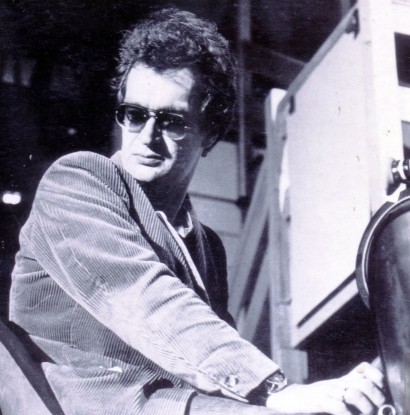WIM WENDERS – Movie Director

(Dusseldorf (Germany), 1945 – )
Wim Wenders grew up in an upper middle class family: his father was head surgeon at the St. Joseph Hospital of Obernhausen – Sterkrade in the Ruhr region of Germany, and his mother was a homemaker. He received a very rigid religious education and when he was young thought about entering the seminary to become a priest. He attended College at first as a major in Medicine, then as a major in Philosophy, but obtained scarce results. His main interest was watercolor painting. After interrupting his studies, Wenders found a full time job in the offices of United Artists in Dusseldorf, and for the first time in his life came in contact with the world of cinema. A great passion was born for him towards this art, so great that he moved to Paris and tried to be admitted to the famous Idhec School of Cinematography, but he was not selected. For one year he adapted to work as a copper engraver. In 1967 he enrolled in the Television and Cinema High School in Munich. His initial intention was to write for cinema, rather than to be a movie director. From 1968 to 1970 he published cinematographic reviews in Filmkritik and in Suddeutsche Zeitung. In the meantime he shot a few short films. In his first works an exasperation of realism in the angles of shooting is evident and an experimentation of counterpoint techniques can be noted between the images and the rock music in the background. These characteristics will be present in all of his movies. Among his first works, Im Lauf der Zeit (Kings of the Road) is famous. In 1982 he won the Golden Lion at the International Cinema Festival of Venice with the movie Lightning over Things and two years later he won a Golden Palm at the Cannes Festival with the movie Paris, Texas. A characteristic of Wender’s work is the experimental use of cinematographic techniques that modern technology makes available. He also made several commercials for Cadillac and Pontiac, and for the home appliances of the Italian company Ariston, and in 1998 a spot for the German railroads. For Barilla he filmed a spot in 2001 in South Africa, scripted by Alessandro Baricco (> Link Scheda). The spot lasted 90 seconds and in it the 125 years of history of the company were remembered in a moment of great poetry and great cinema marked by the contrasts and counterpoint of Wender’s narrative strengths.
C.F.
Bibliography:
Wim Wenders. Turin, Canale for Ramsay Poche Cinema, 1987.